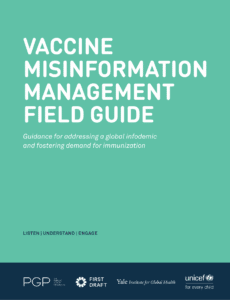Misinformation Alerts
Knowing what misinformation is being shared can help you generate effective messaging.
These insights are based on a combination of automated media monitoring and manual review by public health data analysts. Media data are publicly available data from many sources, such as social media, broadcast television, newspapers and magazines, news websites, online video, blogs, and more. Analysts from the Public Good Projects triangulate this data along with other data from fact checking organizations and investigative sources to provide an accurate, but not exhaustive, list of currently circulating misinformation.
Misinformation Alerts
Knowing what misinformation is being shared can help you generate effective messaging.
These insights are based on a combination of automated media monitoring and manual review by public health data analysts. Media data are publicly available data from many sources, such as social media, broadcast television, newspapers and magazines, news websites, online video, blogs, and more. Analysts from the Public Good Projects triangulate this data along with other data from fact checking organizations and investigative sources to provide an accurate, but not exhaustive, list of currently circulating misinformation.Alerts are categorized as high, medium, and low risk.
- High risk alerts: Narratives with widespread circulation across communities, high engagement, exponential velocity, and a high potential to impact health decisions. Are often more memorable than accurate information.
- Medium risk alerts: Narratives that are circulating in priority populations and pose some threat to health. Potential for further spread due to the tactics used or because of predicted velocity. Often highlights the questions and concerns of people.
- Low risk alerts: Narratives that are limited in reach, don’t impact your community, or lack the qualities necessary for future spread. May indicate information gaps, confusion, or concerns.
A U.S. senator who has previously spread COVID-19 and vaccine misinformation claimed during an interview that masks don’t work, citing a 2020 Danish study. The study’s results were inconclusive, with the researchers emphasizing that "this trial did not address the effects of masks as source control or as protection in settings where social distancing and other public health measures are not in effect." In the year since the study was published, other larger studies have demonstrated that masks are effective at reducing COVID-19 transmission.
Recommendation: Mask mandates and masking continue to be a divisive issue. Emphasizing that widespread vaccination and indoor masking are some of the best ways to limit the spread of COVID-19 is recommended. Fact Checking Source(s): 
Social media users are claiming without evidence that a large number of athletes are collapsing due to COVID-19 vaccine injuries, specifically myocarditis. These claims are often accompanied by out-of-context videos showing athletes collapsing, which have racked up thousands of views across social media platforms. Many of the videos have already been debunked, while others remain unverified.
Recommendation: A small number of cases of heart inflammation in teens and young adults following COVID-19 vaccination has caused widespread misinformation online. Although responding to each piece of misinformation may detract from priority talking points, organizations are recommended to address these concerns and to update informational and educational materials accordingly. Fact Checking Source(s): 
Conspiracy theories and misinformation began circulating online as soon as WHO labeled Omicron a COVID-19 “variant of concern.” Two popular videos falsely claim that COVID-19 vaccines were designed to fail and that vaccinated people are more susceptible to the virus and new variants than unvaccinated people. These claims are untrue. Researchers don’t know yet if Omicron is more infectious or better able to evade the vaccines than previous variants.
Recommendation: There is understandable confusion about the new Omicron variant and this is fueling misinformation online. While we learn more about Omicron, keeping informational materials up-to-date is recommended. Emphasizing that to date, COVID-19 vaccines have been the best protection against every known COVID-19 variant, and unvaccinated people are at a higher risk from the virus is also recommended. Helpful talking points in English and in Spanish can be found here. Fact Checking Source(s): 
A popular conservative commentator suggested that the Omicron variant is a sign of a never-ending pandemic, alluding to the “new world order” conspiracy theory, which posits that a totalitarian government controls—or will soon control—the entire world. Another viral post insinuated that the variant had been manufactured. COVID-19 variants, including Omicron, arise naturally when SARS-CoV-2 enters cells and replicates. Vaccination dramatically reduces the virus’s ability to reproduce and the possibility that new variants will develop. The more people who remain unvaccinated, the more variants will arise, putting us all at risk.
Recommendation: Due to the widespread confusion around the Omicron variant, ensuring that materials are updated with new information is recommended. It’s especially important to emphasize that new variants will continue to emerge unless more people get vaccinated and global vaccine inequity is reduced. Helpful Omicron talking points in English and in Spanish can be found here. Fact Checking Source(s): 
A new documentary features several prominent COVID-19 opponents who repeat debunked vaccine misinformation. Some of the false claims in the documentary’s trailer include that the CDC is underreporting the deaths of vaccinated people and that COVID-19 vaccines are ineffective and unsafe. Both the CDC and individual states track COVID-19 infections and deaths in vaccinated and unvaccinated people. The COVID-19 vaccines reduce the risk of infection, which in turn reduces the risk of transmission.
Recommendation: This documentary features claims that have already been debunked, but its high-profile nature will drive misinformation online. Continuing to fact-check false claims and partnering with trusted messengers in local communities is recommended. Fact Checking Source(s): 
A group of scientists submitted a Freedom of Information Act (FOIA) request about COVID-19 vaccine data which amounted to around 329,000 pages. The FDA proposed a schedule to release 500 pages each month to allow the 10 employees currently handling FOIA requests time to process the documents. Several viral social media posts are now claiming that the FDA is purposely delaying and suppressing vaccine data. FOIA requests have been used many times in the past to cripple the capacity of federal and state health agencies working on controversial topics, such as tobacco control and gun safety. FOIA requests are a critical tool in a functioning democracy, helping to keep government operations transparent and accountable. However, FOIA requests can be “weaponized” and can require significant resources to be pulled from other essential operations.
Recommendation: 
As more vaccine-hesitant and vaccine-resistant people have gotten vaccinated as a result of mandates, fake home remedies to “undo” the vaccination have popped up on social media. Some treatments claim to “detox” the vaccine from the body using baking soda, Epsom salt, and borax baths, while others claim to “uninject” the vaccine with venom extraction kits or cupping therapy. None of these supposed remedies will reverse the vaccination process but some, such as bathing in borax, may be harmful.
Recommendation: Due to a surge in online conversation around how to “detox” vaccines from the body, debunking this misinformation in educational and informational materials is recommended. Emphasizing not only that these “treatments” will not work but also that they can cause serious harm is recommended. Fact Checking Source(s): NBC, The Guardian
A video of a child experiencing convulsions has resurfaced online with claims that the child suffered a seizure after getting the COVID-19 vaccine. The video previously gained traction in May, when it was debunked by the child's father, who said the boy has epilepsy and has experienced seizures since 2009.
Recommendation: Although responding to each piece of misinformation can detract from priority talking points, it’s worth noting the uptick in vaccine misinformation around children. As more countries begin vaccinating younger age groups, ensuring that materials address common parental concerns is recommended. Emphasizing that kids can and do get sick from COVID and that the vaccines are the best tool for protection is recommended. Helpful talking points in English and in Spanish can be found here. Fact Checking Source(s): AP
As COVID-19 vaccines began being administered to children ages 5 to 11 around the country, opposition to the vaccines has picked up steam. A prominent actor publicly stated that he won’t vaccinate his children, while news articles and viral social media posts urge parents not to vaccinate their children or refuse the second dose of the vaccine. The low-dose Pfizer COVID-19 vaccine has been studied rigorously in children, with no serious side effects being reported in any of the clinical trials. The vaccine reduces children’s risk of getting and transmitting COVID-19, protecting kids and their families.
Recommendation: Due to a surge in online conversation around how to “detox” vaccines from the body, debunking this misinformation in educational and informational materials is recommended. Emphasizing not only that these “treatments” will not work but also that they can cause serious harm is recommended. Fact Checking Source(s): Mayo Clinic, Johns Hopkins, MU Health 
A social media post with over 75,000 engagements shows an apparent Freedom of Information Act (FOIA) request response that states that the CDC has no record of any unvaccinated person who was reinfected with COVID-19 spreading the virus to others. The response goes on to say that the CDC does not collect that information. The FOIA response makes no claims about the effects of previous COVID-19 infection on an individual’s ability to transmit the disease. Several studies have shown that, among people who have had COVID-19, those who are vaccinated are less likely to be reinfected and have a stronger immune response than any other population.
Recommendation: There is widespread confusion over whether “natural” immunity is better or worse than vaccine-derived immunity. Reiterating that the only safe way to acquire immunity is through vaccination is recommended. Helpful talking points can be found here. Fact Checking Source(s): Washington Post, CDC, Nature
Alerts are categorized as high, medium, and low risk.
- High risk alerts: Narratives with widespread circulation across communities, high engagement, exponential velocity, and a high potential to impact health decisions. Are often more memorable than accurate information.
- Medium risk alerts: Narratives that are circulating in priority populations and pose some threat to health. Potential for further spread due to the tactics used or because of predicted velocity. Often highlights the questions and concerns of people.
- Low risk alerts: Narratives that are limited in reach, don’t impact your community, or lack the qualities necessary for future spread. May indicate information gaps, confusion, or concerns.
Vaccine Misinformation Guide
Get practical tips for addressing misinformation in this new guide. Click image to download, or see highlights.



